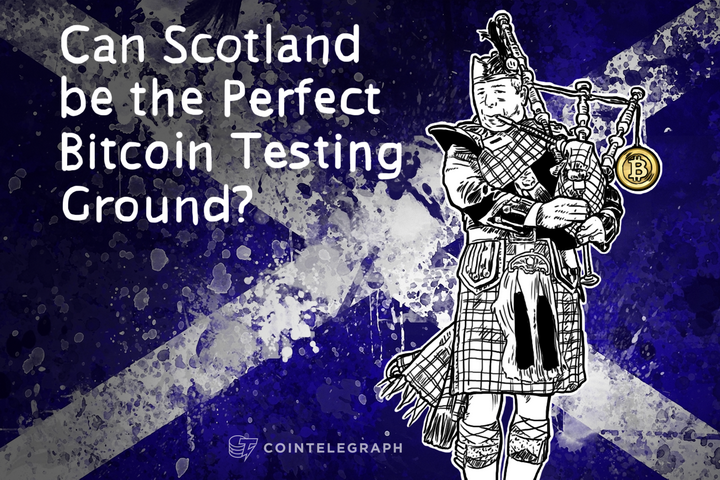Bitcoin, and in fact all cryptocurrencies, is an experiment in a completely new economic paradigm. While cryptocurrencies are money the economic system upon which they are based is far different than most people understand and in fact this type of system has never been tried before. This means that if cryptocurrencies are ever going to prove themselves they will need a testing ground that has a large enough population to allow us to judge the effect of cryptocurrencies on a wider scale. There has been some recent speculation that Scotland might be the ideal location for such an experiment.
The argument is centered around Scotland for a very interesting reason. During the 18th and 19th centuries banks in Scotland were allowed to print their own money in what was called the “free banking” project. Those arguing against the idea claim that the experiment was a failure and had to be ended but there are plenty who would disagree with them, Guy Debelle, Assistant Governor of Australia's central bank. During the Financial Times Camp Alphaville Conference in London this year Debelle was quite enthusiastic when he referred to the upcoming September Independence Referendum:
"Those guys have a bit of experience with competing currencies back in the 18th and 19th centuries. So I suppose one possibility is, if the vote for independence actually gets up, they're going to be short a currency, given that the last time we talked Mark Carney is not entirely clear that he wants to let them use the pound anymore.
"The Scots can go back to experimenting with a multitude of currencies, Bitcoin and the like, and we can just sit back and see how it goes. A nice natural experiment about the future of money in Scotland – again. Because as I said, they tried this in the 18th and 19th centuries. It worked for a while, but eventually it fell apart."
David Birch, director of digital currency consultants Hyperion agreed and went on to say that the earlier experiment was in fact not a failure. Instead, during this period, there were actually fewer bank failures than England did during the same period and that overzealous regulation ended the experiment:
"Competing note issue in Scotland didn't end because it collapsed: it ended because of an outrageous extension of the Bank Act of 1844, which extended the Bank of England's monopoly over note issue north of the border."
A False Comparison
The fact is however that the earlier experiment cannot really be used for one very important reason. The issuance of the currency was still in control of a banking network, which could be precisely controlled by individuals or cabals for their own benefit. The Bitcoin protocol however is exactly the opposite. Instead of centralizing money control puts it back into the individual's control. The entire objective is to avoid creating conditions that would enable monopolies. Central authority in any economic matters always results in the concentration of wealth.
The most common belief in the United States is that the government controls the money. But in reality, it is the banks that decide how much money to print and when to distribute it, as well as how much interest is attached to that money a la the Fed. Money is created in the current system whenever someone takes out a loan. The lending banks borrows the money from the Federal Reserve Bank, which is a cartel of private banks, not a government agency, and the Federal Reserve uses these requests in ordering the printing of fiat currency. This system has been in place in the United States for about a century and abysmal track record speaks for itself.
Another View Point
David Galbreath, co-founder of Yelp and co-creator of RSS believes that not only is the Scotland idea doomed but that Bitcoin, and cryptocurrencies, cannot succeed without monopolistic platforms.
"I'm basically an internet nerd. We normally try to replace middlemen with a platform. But if you look at innovation in payments, I'm not so sure it's going well."
Galbreath said that he had checked more than 600 mobile payment startups and that all of them were simply trying to introduce a new payment system on top of another platform. According to Galbreath, Bitcoin can never be big without the support of platforms and whoever controls the platforms will control the economy, much the same as the banks currently do.
But regardless of who is on the right track, a full blown experiment in a real economy will be necessary and Scotland is an excellent choice for many different reasons. The country has been overall welcoming to cryptocurrencies. If it were to make the switch the country could become a very good testing ground.
I Luv Scotland Loves Bitcoin
For example, one of the latest companies to join the BTC merchant crowd is I Luv Scotland (I Luv LTD), a very popular and rapidly growing e commerce site based in Scotland that specializes in Scottish made gifts and other merchandise. The company has a inventory of more than 20,000 products and ship globally to both individual and corporate clients. The company has already begun to feel the affects of opening their doors to cryptocurrencies.
Alistair Neil, Director for the company, says that he was surprised at the positive effect that Bitcoin has had on their site. But the fact is that when you offer more payment options it naturally opens the door to more potential customers and more and more businesses are beginning to understand this fundamental business rule.
Given the increasing uptake by businesses and with the promise of independence along with its location that’s not too far from the financial hub of London, Scotland may be in a truly unique position to become a Bitcoin hotbed.
Looking for the best applicant for your vacancy? Or trying to find your perfect job? Send your job offers and CVs to hr@cointelegraph.com! We will find the best for the best!


